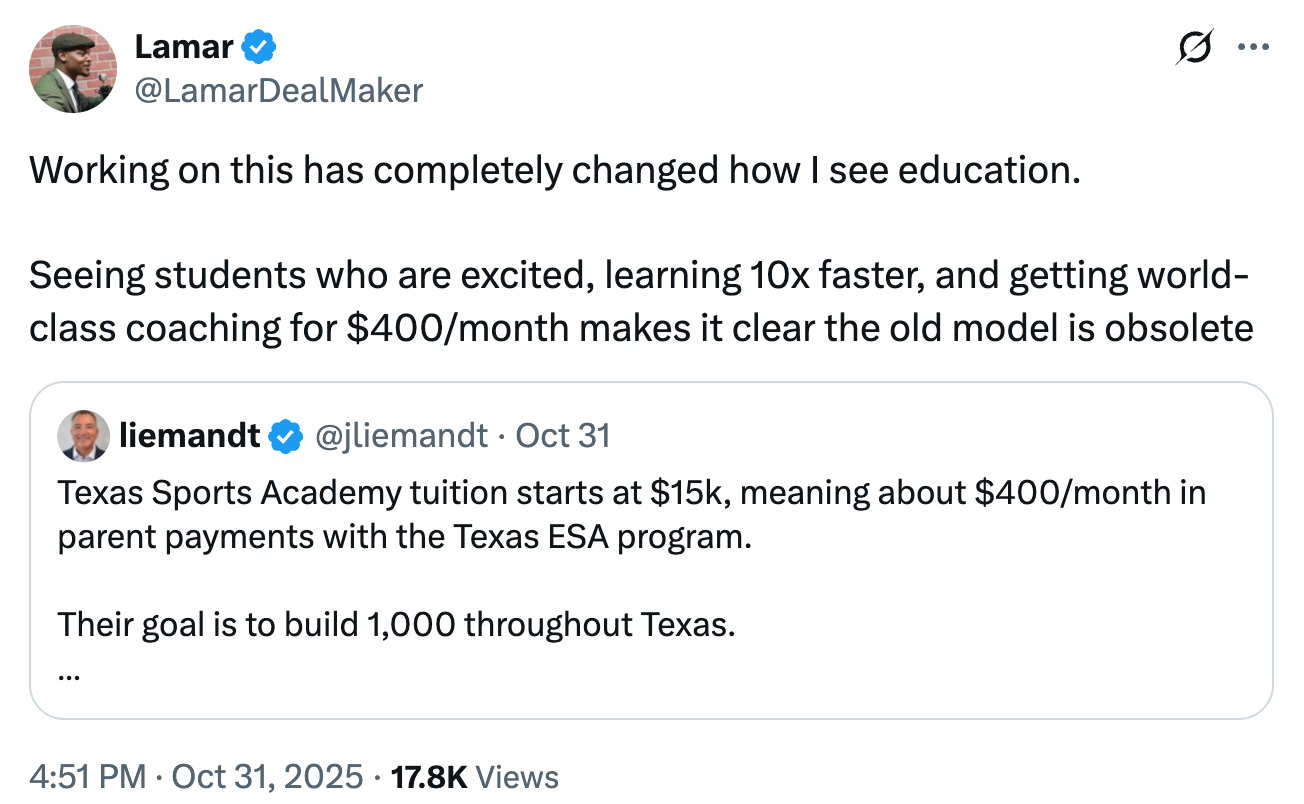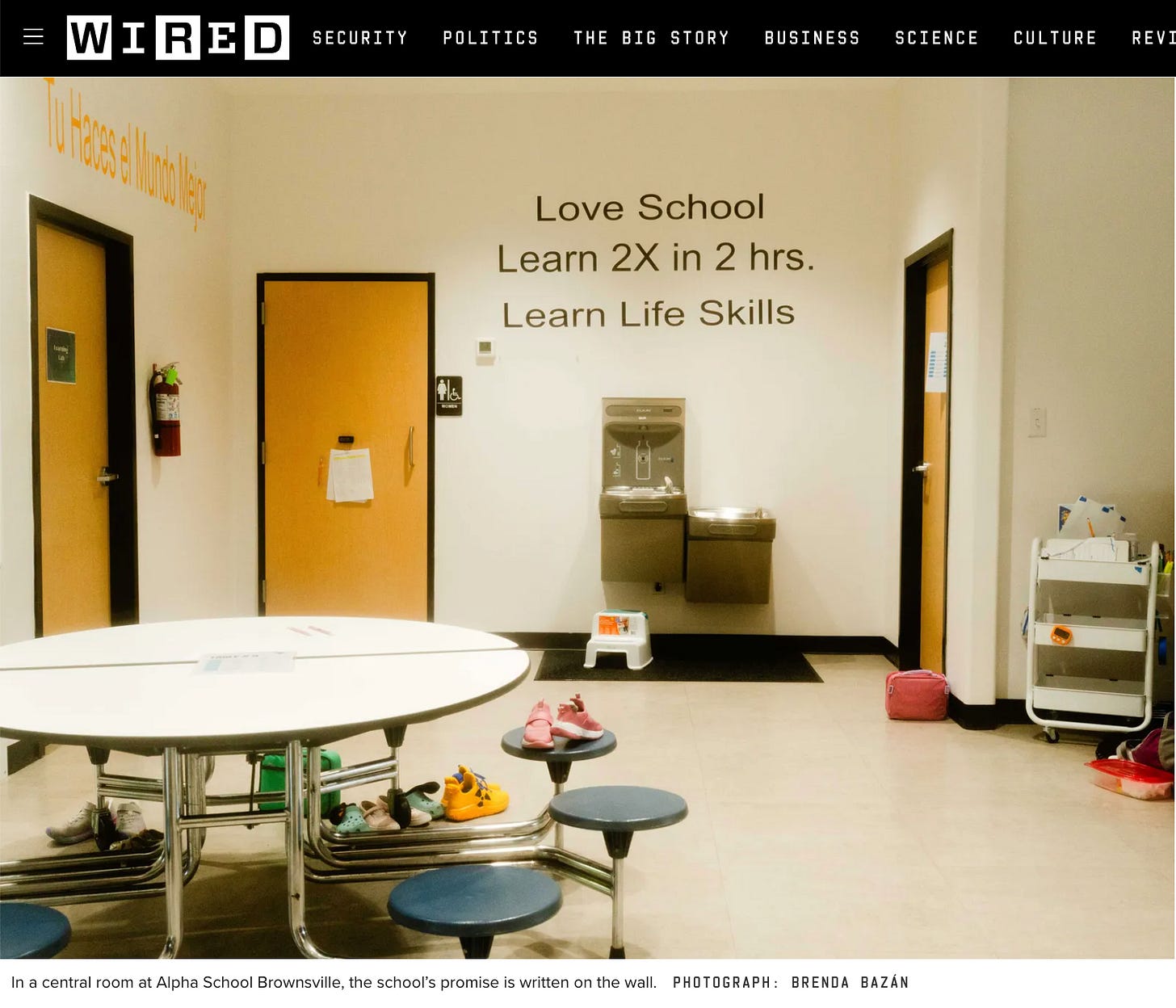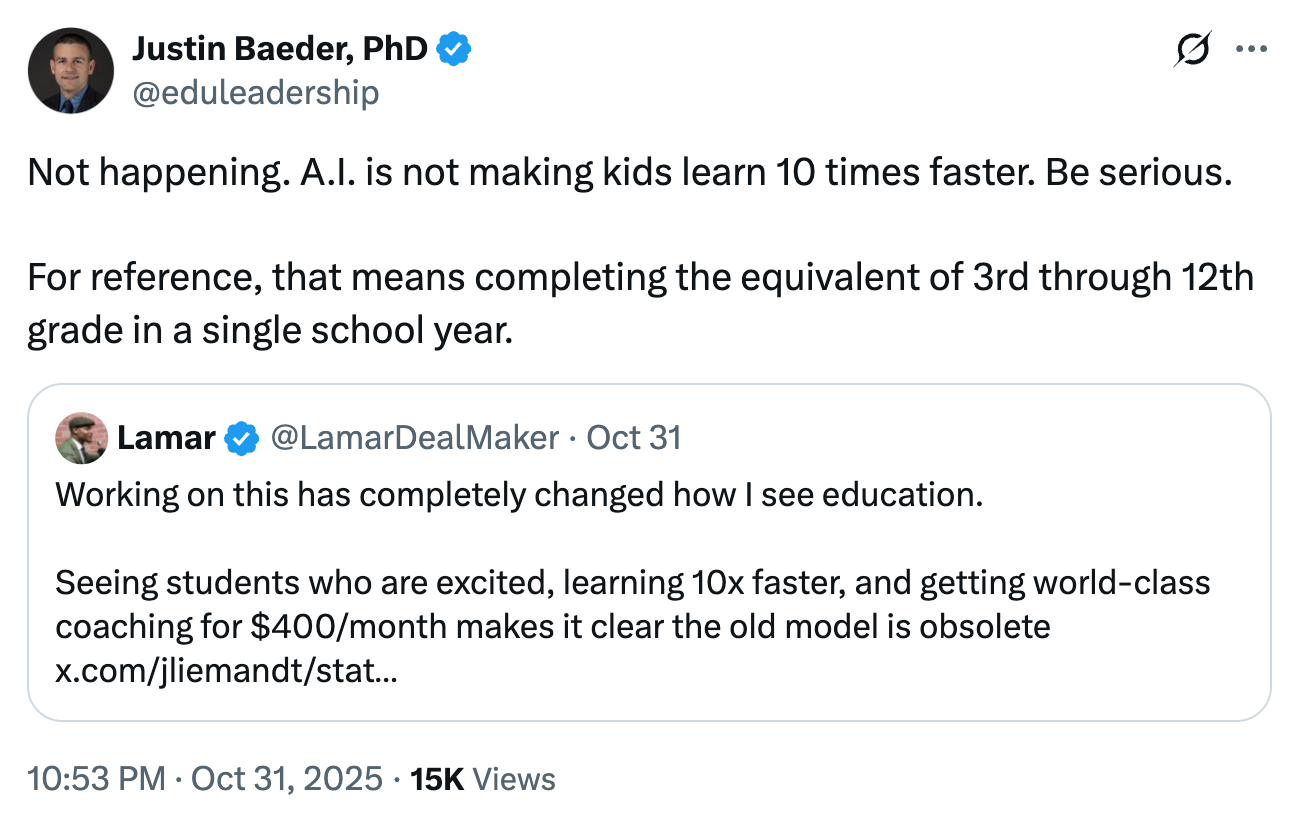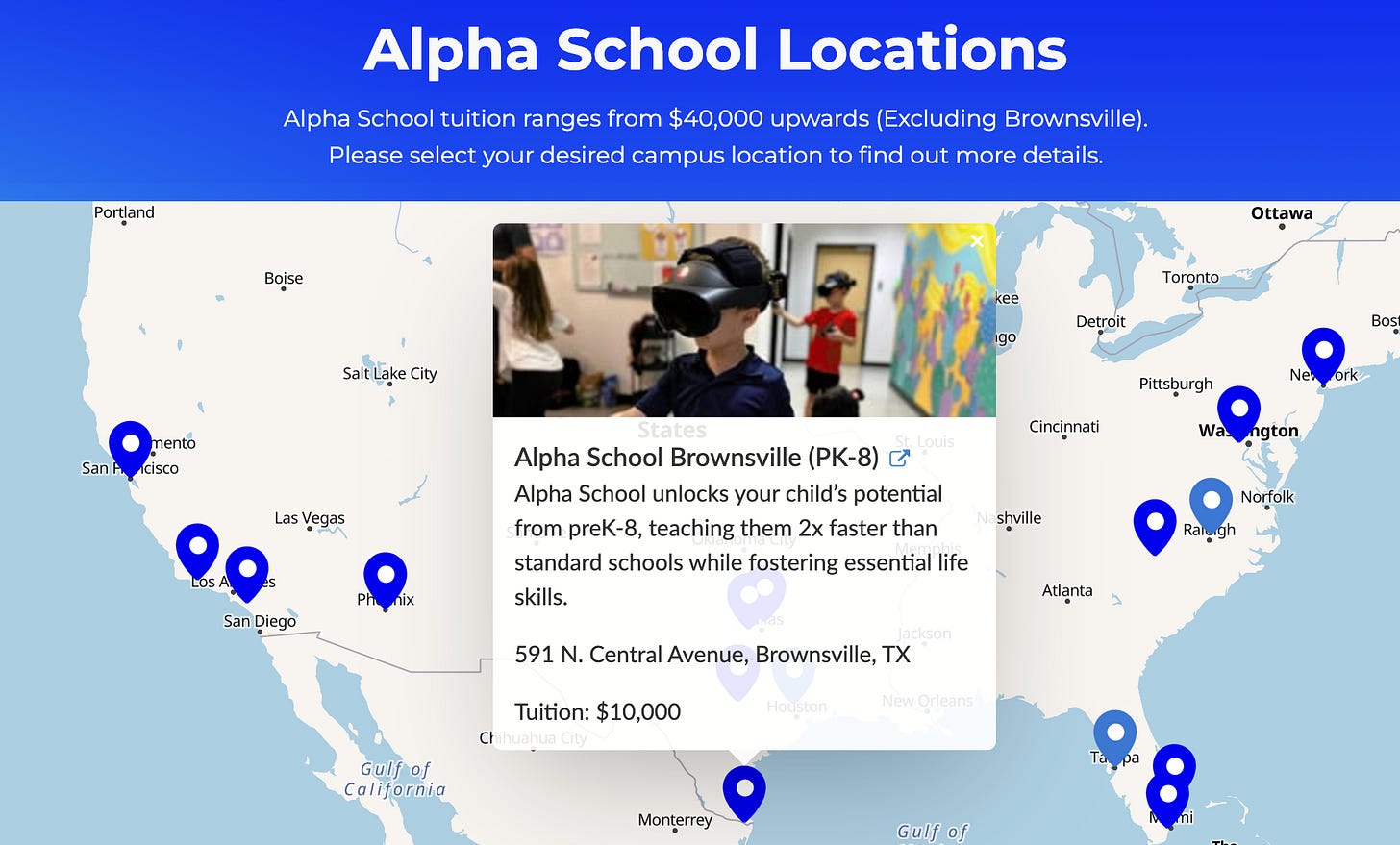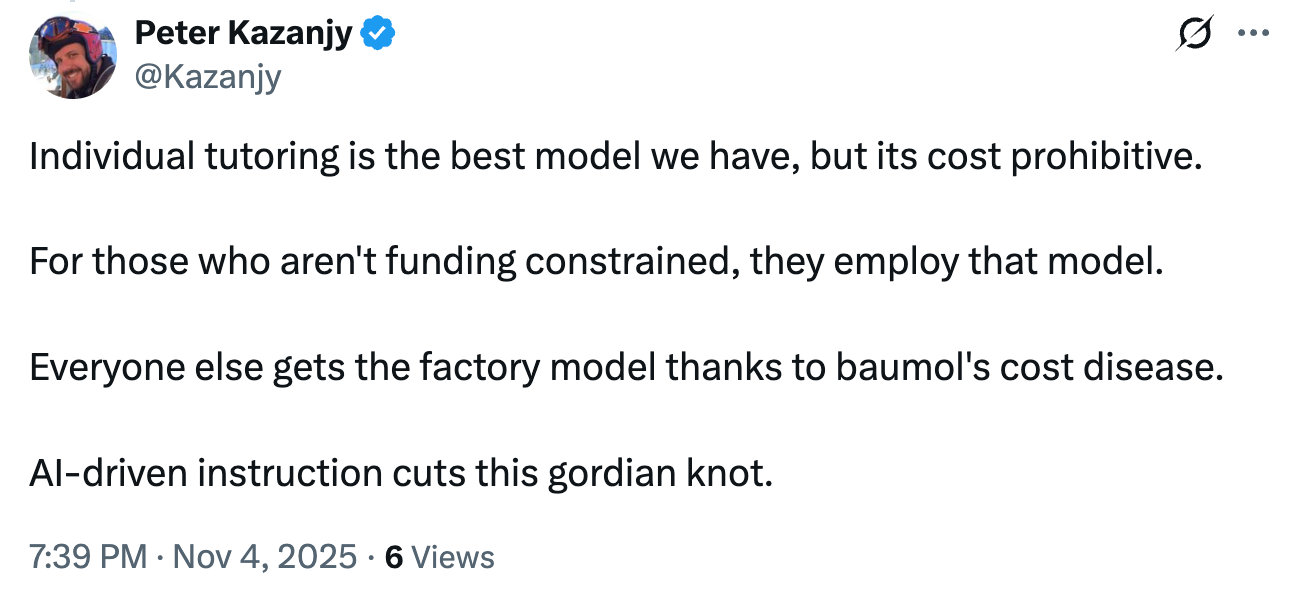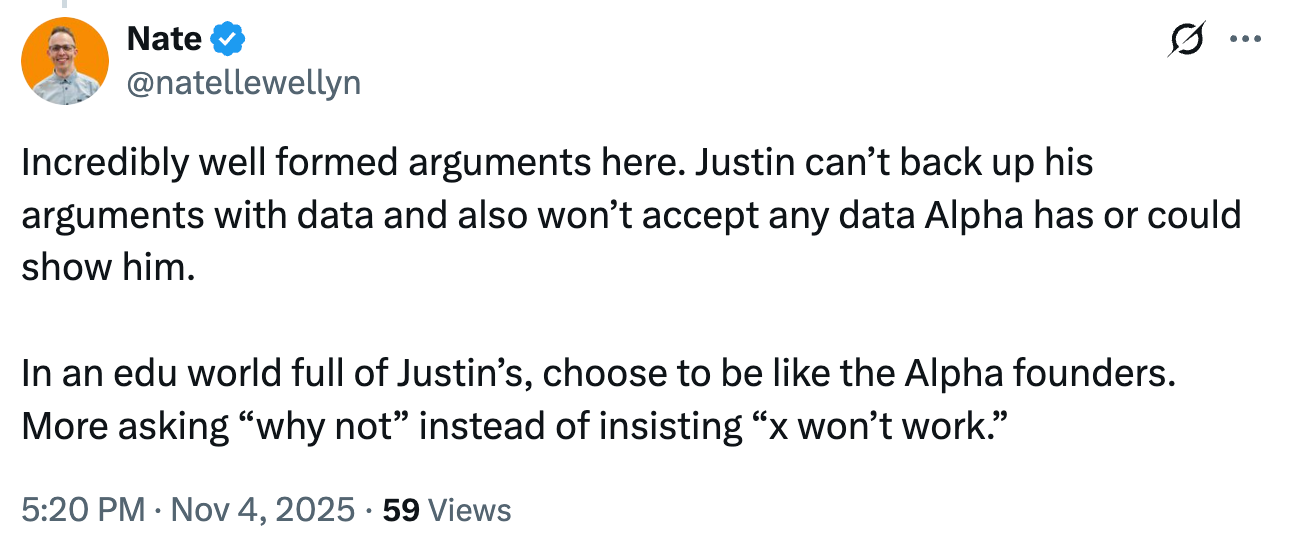Alpha School Q&A
An education philosopher responds to the excess of enthusiasm for the AI-powered school model
My X posts on Alpha School have attracted a number of recurring questions, so I’m compiling them and my responses here. This article may be updated to address new questions.
The Original Claim: “Learning 10x Faster”
@LamarDealMaker (apparently a developer for Alpha or a Texas Sports Academy school using Alpha’s model model) claimed that students are “learning 10x faster” than with the “old model”:
Note: Alpha School’s canonical claim is “Learn 2X in 2 hrs” according to this photograph that appeared in Wired Magazine.
MacKenzie Price, one of the founders of Alpha and 2 Hour Learning, told WIRED: “ Our students are learning twice as much, our classes are top 1 percent across grades and subjects, and we’re doing it all in a much, much shorter amount of time.” (Price’s claim is based in part on comparisons of standardized test data. While Price initially said that Alpha would share its data with WIRED, it has not done so.)
The claim “our classes are top 1 percent across grades and subjects” is both unverified and likely to be largely the result of Alpha’s 5-figure tuition.
My Original Rebuttal
I replied that students learning 10x faster is not happening:
Since the original claim was presented without evidence, I am under no obligation to provide evidence that it’s false—nor is it ever incumbent upon the skeptic to prove a negative. Rather, the burden of proof lies with the party making the extraordinary claim.
The “10x faster” claim is implausible and would be extraordinarily difficult to prove, given strong selection effects such as Alpha’s $40,000/year tuition and selective enrollment.
Indeed, even free public charter schools that admit students on a lottery basis have been shown to have strong selection effects that make it difficult to compare them to traditional public schools—let alone to attribute achievement results to a specific feature of their program.
One often-touted form of triangulation for Alpha’s model is their campus in Brownsville, TX, which charges only $10,000 rather than the usual $40,000+.
The Alpha model clearly works well enough—for enough students—that multiple campuses across the country are viable.
However, “We have succeeded in attracting an adequate number of paying students” is a very different claim from “Students are learning 10x faster.”
Q: Do Students Learn Faster With Alpha’s Model?
A: My assumption is yes, students learn slightly faster with Alpha’s model, which involves spending about 2 hours a day on a computer with AI and other educational technology to deliver core content.
However, there is currently no data available that can definitively answer this question.
Q: Why Can’t We Tell if Alpha’s Model Is Superior?
A: Because Alpha’s student population is far from typical, most effects we observe in its outcome data are likely to be functions of enrollment, not instruction.
This is an issue that plagues all education research, not just assessments of Alpha School’s effectiveness. For a detailed overview, see Freddie deBoer’s article Why Selection Bias Is The Most Powerful Force In Education.
However, the issue is particularly pronounced in the case of Alpha because of the extraordinarily high tuition.
Q: Why do you assume Alpha’s model won’t work?
A: I don’t make such an assumption. Pointing out the lack of evidence is not the same as refusing to believe any future evidence that might emerge.
Q: If tutoring is the best instructional model, and human tutors are prohibitively expensive, isn’t AI-driven tutoring a great option?
A: Ironically, human tutors would probably be significantly less expensive than Alpha.
At any rate, Peter says:
My response is that individual tutoring hasn’t been demonstrated as an overall schooling model at any kind of scale. It’s used only very narrowly, e.g. for actors who can’t be in school, or for focused remediation in single subjects.
Some ed tech including AI is probably helpful, but we should not expect it to be a 10x breakthrough.
Specific Points by Pat Azi
This detailed post by Pat Azi raises several issues that I’ll address one by one.
“Zero evidence that teacher-led classrooms will remain optimal against new paradigms like Alpha.”
Pat says:
You claim: “school is unmatched at getting kids to learn stuff that they wouldn’t otherwise learn.”
“Unmatched” only means best system so far. It provides zero evidence that teacher-led classrooms will remain optimal against new paradigms like Alpha.
Correct. I am not claiming that traditional classrooms are the best approach that will ever be discovered.
However, I’m arguing that Alpha has not yet proven to be a superior model. It remains to be seen whether it can match, let alone surpass, the status quo in an apples-to-apples comparison.
I made this point on Dr. Phil Primetime in response to my interlocutor Jeanne Allen, who advocated for alternative models like Alpha’s:
Transcript:
I would find that a more compelling argument if these schools had a track record. But what they have a track record of doing is marketing and attracting families and skimming families from public schools. Then not a lot to show for it after that. I think we would have seen much greater shifts in the population toward that type of school. But the reality is most of what they’re talking about is experimental. The thing about experiments…I was a science teacher. The thing about experiments is, they’re difficult. And most of the time you don’t find something better in an experiment. So whenever we criticize the status quo, we have to realize that the good results that we’re getting are coming from the status quo as well as the bad results. And if we’re going to shift to something completely different, we have to make sure that that alternative can deliver the good results that the status quo is currently delivering, as well as address the shortcomings of it.
“With personalized learning…students learn more.”
Pat says:
You ask: “Think about how much you learn in one course in the span of a year. Is there any other scenario where you would have learned all of that stuff?”
Yes. Traditional classrooms artificially constrain learning volume and velocity by forcing one pace for 30 students. With personalized learning, faster students aren’t held back by class pace, and slower students don’t accumulate knowledge gaps that compound over time. Both learn more than in a one-size-fits-all model.
Pat is missing my question here, and answering a totally different question.
To my earlier point that school is unmatched at getting kids to learn stuff they wouldn’t otherwise learn, Pat offers nothing.
However, I’ll respond to his claim that both faster and slower students “learn more than in a one-size-fits-all model.”
This is easy: there’s simply no evidence for this assertion.
Nearly all education in the US is delivered in what Pat would call a “one-size-fits-all model.”
Traditional schooling currently operates at scale. How it functions and what it accomplishes are widely known (though sometimes misunderstood).
New paradigms like Alpha do not operate anything like the societal scale of public schools; they are a specific type of expensive private school, where selection effects swamp any effects of the instructional model.
So far, we do not even have any clear evidence that Alpha’s model isn’t worse—and to be clear, there are three basic possibilities of interest:
It’s roughly the same—no major difference between Alpha and traditional classrooms
It’s significantly better
It’s significantly worse
My money is on the first possibility. I think Alpha’s model is probably fine, but not significantly better or worse.
“Instruction and motivation are two different tasks…few excel at both because they’re completely different skills.”
Pat says:
You argue: “we are going to always need human teachers because it’s not about just the explanations and the information, it’s about the motivation.”
Instruction and motivation are two different tasks. Traditional teachers split cognitive load between content delivery and student motivation. Few excel at both because they’re completely different skills. Alpha unbundled them: AI handles instruction with consistency and personalization impossible for any human to give 30 students. Guides focus exclusively on motivation with zero time spent on lesson planning or content delivery. Then the system enforces learning with periodic mastery gates that block advancement until proficiency, and validates growth by requiring 90%+ on external third-party tests to pass a grade level.
As an educator, I find this to be a rather odd framing, and I’m not sure what evidence Alpha has that its “guides” are actually effective at motivating students to learn the content.
If a student loses motivation, they can simply leave the school and disappear from Alpha’s statistics. This is not an option in traditional public schools, where failures to learn are visible.
Again, this is not an issue unique to Alpha; it’s also a major barrier to research in charter schools, which suffer from high rates of attrition.
“Choose to be like the Alpha founders.”
Nate seems offended by my skepticism and suggests that people choose to be more like Alpha’s founders:
To be clear, I’m not insisting that it won’t work. I’m insisting that it’s unproven—Alpha’s model has not yet been demonstrated to be superior to traditional classrooms.
Simply wanting something to work is of very little value. One might even argue that it’s unethical to sell something for $40,000 a year when you can’t even provide evidence that it works. But to each their own.

